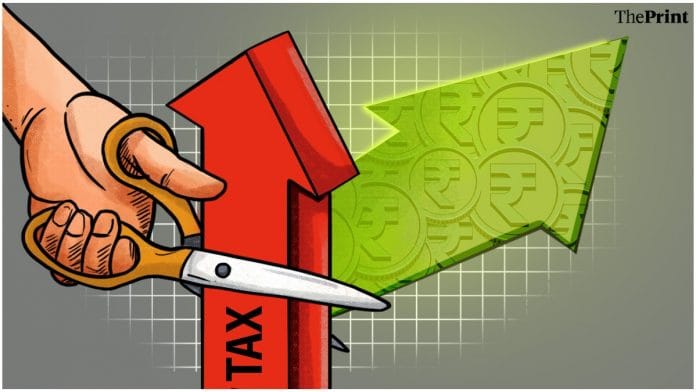Thank you dear subscribers, we are overwhelmed with your response.
Your Turn is a unique section from ThePrint featuring points of view from its subscribers. If you are a subscriber, have a point of view, please send it to us. If not, do subscribe here: https://theprint.in/subscribe/
A windfall tax is a one-time levy on companies earning unusually high profits due to favourable market conditions. For example, in 2022, the Indian government imposed a windfall tax on domestic crude oil producers, targeting profits above a set crude oil price threshold following a surge in prices caused by the Russia-Ukraine conflict.
India imposed a windfall tax for the first time on July 1, 2022. This move targeted domestically produced crude oil and certain petroleum product exports, including diesel, petrol, and aviation turbine fuel (ATF), amidst surging global oil prices following the Russia-Ukraine conflict. The initial rates were:
- Crude Oil: ₹23,250 per tonne.
- Diesel Exports: ₹13 per litre.
- Petrol Exports: ₹6 per litre.
- ATF Exports: ₹6 per litre.
As per the Economic Times, Between July 2022 and December 2024, the windfall tax garnered approximately ₹44,000 crore in revenue.
The Windfall Tax was primarily introduced to generate revenue, promote wealth redistribution by funding public welfare initiatives, and address inequality. It ensures that companies reaping unexpected profits contribute more significantly to societal development.
Problems with the windfall tax
A key issue is the arbitrary nature of thresholds. For instance, in India (2022), the government set the windfall profit threshold at crude oil prices above $75 per barrel. However, this approach overlooks variations in production costs across companies, sparking debates over what qualifies as “normal” versus “excess” profits.
Another issue is of moral hazard for example Venezuela introduced a windfall tax on oil profits in 2011, using the revenues to fund subsidies and welfare programs. Over-reliance on this revenue discouraged the government from diversifying the economy or developing sustainable fiscal policies. When oil prices dropped, Venezuela faced severe fiscal and economic crises.
The windfall tax also discourages investment e.g. In the United Kingdom (2022), the windfall tax on oil and gas companies (Energy Profits Levy) led companies like Shell and BP to announce plans to review or cut back on investment in renewable energy projects, citing uncertainty and reduced returns on capital. Similarly in the 1970s-1980s The United Kingdom Windfall Tax on North Sea Oil led to Lower Investment in Oil Exploration and Capital Flight.
Another concern is disincentive to efficiency. For example, during the U.S. windfall tax on oil companies (1980-1988), smaller companies argued that their gains were the result of efficiency improvements and better technology, not external factors like global oil prices. However, they were taxed equally, reducing incentives for operational efficiency.
The volatility in tax policy is another matter of concern for example in India, the windfall tax rates on crude oil and fuel exports were revised multiple times in a short span (i.e. 6 adjustments between July 2022 and September 2024). This unpredictability disrupted long-term financial planning for oil producers and refiners.
Reduced Competitiveness European Union’s windfall tax on energy companies (2022) increased the tax burden on firms operating within the EU. In contrast, non-EU competitors from countries without such taxes (e.g., U.S.-based firms) gained a price advantage in global markets.
The windfall tax as seen in the past has further increased reliance on imports for example Martin Feldstein (American economist) was one of the key critics of the windfall tax on oil companies imposed during the Carter administration in the 1980s. He argued that the tax would reduce domestic production and increase reliance on imports, thus hurting consumers in the long run. Feldstein believed that such a tax would distort market signals and hurt both consumers and the economy by reducing oil production and leading to higher prices.
Risk of Tax Avoidance also pertains for example in response to Argentina’s windfall tax on agricultural exports (2022), many soybean exporters stockpiled their produce instead of selling it, waiting for more favourable tax conditions. Others rerouted sales through neighbouring countries to evade the tax.
Suggestions
First is to avoid unnecessary attempts to distort the market.
If the government taxes profits generated from unforeseen events, it should also be prepared to offer subsidies when profits decline due to global uncertainties. For instance, during the 2014-2015 oil price crash, countries like Saudi Arabia and Russia provided subsidies to support domestic energy production and sustain investment in oil exploration.
Norway, like other oil-producing nations, considered introducing windfall taxes on oil profits during periods of high global oil prices in the 1980s-1990s. But considering the criticism Norway took a more cautious approach, investing oil revenue in its Sovereign Wealth Fund, which helped stabilize the economy.
Governments can also support renewable energy investment during low fossil fuel prices through subsidies or incentives like feed-in tariffs, ensuring stable returns and fostering a green energy transition.
These pieces are being published as they have been received – they have not been edited/fact-checked by ThePrint



It’s knowledgeable article.